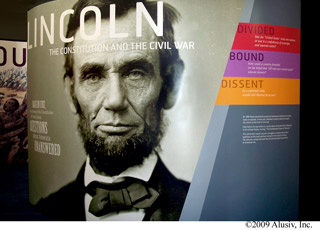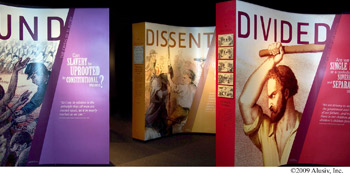
A three-member panel of scholars will discuss constitutional issues presented by the Civil War Thursday, Jan. 10 at 4:30 p.m. in Lawrence University’s Wriston Art Center auditorium. The program will include a question-and-answer session with the audience.
The presentation is in conjunction with the 1,000-square-foot traveling exhibit “Lincoln: The Constitution and the Civil War” that is on display in Lawrence’s Seeley G. Mudd Library until Feb. 8. Both the panel presentation and the exhibition are free and open to the public.

Participating in the discussion will be Lawrence faculty members Jerald Podair, professor of history and Robert S. French Professor of American Studies, and Arnold Shober, associate professor of government. Joining them will be 1981 Lawrence graduate James Cornelius, curator of the Lincoln Collection at the Abraham Lincoln Presidential Library & Museum in Springfield, Ill.

The panel will examine a variety of topics, among them:
• What the words “all men are created equal” meant in the Declaration of Independence, what they meant to Jefferson Davis and his fellow Confederates and how did Lincoln interpret the word “equal?”
• Was secession constitutional?
• How did Lincoln and Jefferson Davis reflect clashing understandings of the nature of the “more perfect Union” established by the Constitution?
• Did the Constitution form an unbreakable “contract” with the American people or a revocable “compact” between sovereign states?
• How did the stresses of civil war erode civil liberties in the United States?
• How did Lincoln balance national security and personal freedom during the Civil War, especially with regard to Northern critics of the war?
• Was Lincoln an extraconstitutional “tyrant,” as his political enemies argued?
About Lawrence University
Founded in 1847, Lawrence University uniquely integrates a college of liberal arts and sciences with a nationally recognized conservatory of music, both devoted exclusively to undergraduate education. It was selected for inclusion in the Fiske Guide to Colleges 2013 and the book “Colleges That Change Lives: 40 Schools That Will Change the Way You Think About College.” Individualized learning, the development of multiple interests and community engagement are central to the Lawrence experience. Lawrence draws its 1,500 students from nearly every state and more than 50 countries. Follow Lawrence on Facebook.


 While Abraham Lincoln is narrowly identified as the “Civil War president,” Burton argues Lincoln actually defined the entire second half of 19th-century American history by setting in motion the forces that made individual freedom America’s preeminent value. Burton will examine the role Lincoln’s Southern roots played in conducting a civil war that turned freedom into a personal right protected by the rule of law and placed that concept at the center of American identity.
While Abraham Lincoln is narrowly identified as the “Civil War president,” Burton argues Lincoln actually defined the entire second half of 19th-century American history by setting in motion the forces that made individual freedom America’s preeminent value. Burton will examine the role Lincoln’s Southern roots played in conducting a civil war that turned freedom into a personal right protected by the rule of law and placed that concept at the center of American identity.